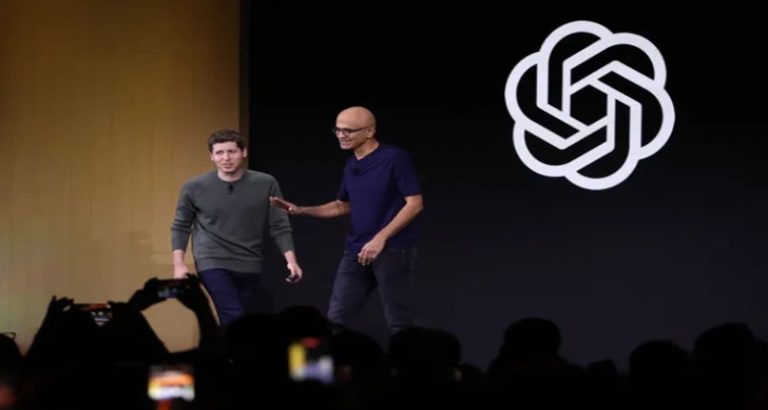
Artificial General Intelligence, or AGI, is a term that’s become as overused as it is misunderstood. While commonly defined as a hypothetical AI system capable of outperforming humans across a wide range of intellectual tasks, what AGI actually means in practice depends heavily on who’s talking—and what they’re trying to sell. In the case of OpenAI and Microsoft, the ambiguity around AGI isn’t just academic—it’s contractual.
At the heart of their multibillion-dollar alliance is a clause that states their partnership ends once OpenAI reaches AGI. On paper, that might sound like a bold but clear benchmark. In reality, neither side has offered a precise definition. That confusion was compounded by a leaked document earlier this year suggesting AGI, at least to OpenAI, might simply mean an AI model that can generate up to $100 billion in profit—a purely commercial yardstick that raises more questions than answers.
However, AGI—whatever it means—is a loaded term in Silicon Valley. It signals ambition, investor confidence, and control. But it has now become a flashpoint between two companies that once boasted one of the closest partnerships in the AI industry. Behind the scenes, tensions are building.
Register for Tekedia Mini-MBA edition 19 (Feb 9 – May 2, 2026).
Register for Tekedia AI in Business Masterclass.
Join Tekedia Capital Syndicate and co-invest in great global startups.
Register for Tekedia AI Lab.
Microsoft, which has pumped about $14 billion into OpenAI and supplies the bulk of its cloud computing power, is increasingly wary that OpenAI may prematurely declare AGI to trigger the partnership’s termination clause. The Wall Street Journal reported that Microsoft executives were skeptical about agreeing to the clause in the first place, but accepted it out of desperation—at the time, the company was scrambling to catch up in the AI arms race.
That clause is now a legal tripwire. If OpenAI moves to declare AGI, Microsoft could challenge the declaration in court, accusing the company of acting in bad faith. But pursuing legal action would plunge the dispute into what one executive reportedly described as “a legal thicket,” with the risk of locking the issue in litigation for years.
According to The Information, OpenAI’s executives are currently eyeing a public AGI declaration based on the release of an advanced coding agent—one that surpasses the abilities of a top-tier human programmer. If that happens, Microsoft could lose access to OpenAI’s best models and intellectual property, including any future iterations of GPT. The fallout would be massive.
There are already signs that both parties are preparing for separation. Microsoft has quietly started building its own in-house large language models, aiming to reduce its dependence on OpenAI. The company is reportedly willing to trail OpenAI’s top models by just a few months, as confirmed by Microsoft AI CEO Mustafa Suleyman, who said its off-frontier models will lag OpenAI’s by “three to six months.” Meanwhile, Microsoft is expanding its AI stack by integrating third-party models into Copilot.
The rivalry has spilled into infrastructure as well. Microsoft recently pulled out of two massive data center deals, a move insiders believe was linked to OpenAI’s shifting cloud needs. Although Microsoft was once OpenAI’s exclusive cloud partner, that changed after Project Stargate was launched, a $500 billion initiative backed by the US government to build AI infrastructure, including OpenAI’s own data centers. That project effectively ended Microsoft’s exclusivity—and strained relations further.
OpenAI, for its part, has complained that Microsoft’s infrastructure isn’t fast or scalable enough. Sam Altman, OpenAI’s CEO, has stated that the company is “no longer compute-constrained,” underlining that it may no longer depend on Microsoft’s Azure platform for its most ambitious work.
On the business front, OpenAI has grown increasingly vocal about Microsoft’s demands. A separate report claims that Microsoft is asking for a disproportionately large share of OpenAI’s Public Benefit Corporation (PBC), well beyond what it has offered in return. OpenAI executives are reportedly exploring legal options to challenge what they see as anti-competitive pressure from Microsoft, especially in light of a potential $3 billion acquisition (codenamed Windsurf) that could shift critical IP into Microsoft’s control.
Amid this tension, Satya Nadella has distanced himself from AGI as a concept. The Microsoft CEO dismissed it earlier this year as “nonsensical benchmark hacking”—a clear shot at efforts to shoehorn commercial success into a technical milestone. Meanwhile, Altman has admitted that existing hardware and infrastructure “weren’t built for an AI world,” perhaps implying that true AGI is still out of reach.
Yet for all the confusion, one thing is clear: the AGI clause, once a theoretical safeguard, has become a live wire. If OpenAI declares AGI soon—based on whatever criteria it chooses—it could sever its relationship with Microsoft entirely, ending what was once hailed as one of the most strategically powerful partnerships in tech. And for Microsoft, that might mean walking away from a $14 billion investment, with little more than a trail of court filings and a bruised ego to show for it.



